
1 | Introduction

2 | Meet our contributors
3 | Meet our editors
4 | Black Faces on White Screens - Halim Dyfan
6 | Sound Up - Malcom Kyenune

10| Hope, Representation and Healing: Wakanda Forever - Not Another Superhero MovieMuratiwa Chinake
12 | We Need Equality for Disabled PerformersSanjeev Mann
14| Q&A with Bee Asha Singh artist and Co-Founder of grassroots charity - Spit It Out
16 | Photography Spotlight: Kashish Bhatia, Felix Round and Zaim Ali
20 | A Night to Remember: Proudly Black & Scottish Awards - Hazel Peters
22 | The World of Politics and Policy in Scotland for People of Colour - Lauren Cadore
24| Poetry from Roisin Fedrick, SIN I NG, and Jj Fadaka
26| Writing Has Been My Outlet to Compensate For My Silence - Claudia Efemini
28| Decolonising Wellness: Dismantling The Capitalist Cultural Appropriation of Wellness - Renite Gosal
32| Diaspora Blues - Malini Chakrabarty
contents
Hello Beautiful Readers
Welcome to Scott(ish). No Permission Needed (NPN) second issue!

Scott(ish) is an exploration of what it looks, means, and feels like to be Black and People of Colour (BPoC) in Scotland. The ‘ish’ in Scottish is an acknowledgement that as BPoC our relationship to Scotland can be complicated. Some identify as Scottish and with Scotland. While for some, Scotland is simply the country in which they reside, and others rest in between – we’re Scott(ish).

NPN provides space for BPoC to express themselves without permission. The views and opinions expressed in this publication belong to the contributors, and don’t necessarily reflect the views of NPN.
This issue of NPN is a child of conflicting emotions. It is born from my frustration with how the Scottish identity is constructed to exclude BPoC. It is sown from seeds of anger at media representation, institutions and systems which make it easy to believe that Black and Brown people in Scotland don’t exist or matter. Equally, Scott(ish) is a love letter rooted in the care and nurturing I have received from BPoC in Scotland. Through finding/seeking a community of Black and Brown people, I have learnt to love Scotland – a country that for much of my childhood appeared not to love me.
Just like the conflicting emotions that Scott(ish) originates from, producing this issue has been a turbulent journey accompanied by a steep learning curve. There have been times where this zine has crumbled to dust and slipped through tired hands. This publication is a testimony to the many great minds and kind hearts who have helped put the pieces back together.
I appreciate every editor for your time, effort and patience. The following pages would not read so beautifully without you. Thank you wonderful contributors for your art. I hope seeing it in print (finally!!) brings you much joy. To Nic who planted the seed, look how it’s grown! Lastly, a massive thank you to everyone who donated to our crowdfunder, we may not have reached the finish line without you.
Scott(ish) is available online at https://issuu.com/npnzine or scan the qr code on the back cover. Readers we wanna hear from you! Whether you are reading this in print or online, tag us on Instagram @npnzine. Recommend the zine to your loved ones, colleagues and classmates. Wanna be involved in NPN? DM us on Instagram or email npnzine@gmail.com
Until next time, Hazel x
1
Contributors

Halim Dyfan he/him
Scottish-Sierra Leonean student interested in film, television, black social issues, African history and being a lil geek :)
Instagram: @halimdyfan
J.J Fadaka she/her
Jj is a writer, radical, and friend who uses poetry to discuss revolution, feminism and love. Based in Edinburgh, she facilitates a creative writing workshop at the Community Wellbeing Space every Saturday. Mon - Fri she works and writes in a police box.
Instagram: @jfadaka
Twitter: @jj_round2
Malini Chakrabarty she/her
Malini is an interdisciplinary artist and media researcher who moved to Glasgow alone from India 3 years back for her MSc in Filmmaking and Media Arts. She currently works as a Changemaker decolonising Glasgow Museums and in the Equalities and Human Rights team of NHS Glasgow. She likes exploring her consciousness and the collective consciousness through words, film, photography, visual art, food and clay.
Instagram: @shefilmsthedream
Claudia Efemini she/her
History and Politics student at the University of Edinburgh. Journalist and author of upcoming debut novel ‘A Letter Away From Asaba’.
Instagram: @claudiaefemini and @aletterawayfromasaba
Twitter: @CEfemini
SIN I NG she/her
SIN I NG is a fourth year international student studying English Lit and Philosophy. She is trying to develop a hobby in poetry writing since she has been studying them pretty much half of her life.
Roisin Fredrick (MC) she/her
MC is a writer from Ireland with Nigerian roots. Her work showcases her life throughout the past few years. You can find more of her work on instagram. Instagram @mc_writer
Kashish Bhatia she/they
Kashish does photography as a hobby. She is currently building her portfolio as part of Higher Photography course.
Instagram: @keesh_kapture
Muratiwa Chinake she/her
Muratiwa is from Zimbabwe and currently lives in Glasgow and studies English Literature and Film and Television Studies at the University of Glasgow.
Zaim Ali he/him
Zaim is a creative director and photographer focused on conceptual imagery to highlight the shared culture by migrant and marginalised communities in the West.
Instagram: @zzeeemm
2
Editors
GENERAL EDITOR
Monica Dela Cruz she/her
A blue sky, an oat flat white and a good book in hand at a local (probably) overpriced coffee shop, describes an ideal day for Monica. Born in the Philippines and raised in Scotland. Typical of an English Lit and History graduate, Monica can be found rambling on about weird and wonderful but important theories (particularly intersectionality), her latest reads, and trying to convince people her music taste spans further than that adopted from her dad’s 80s karaoke repertoire.
GLOBAL STORIES EDITOR
Renite Gosal she/her
Renite is a Canadian-British Punjabi poet and spoken-word artist. As a researcher she uses her lived experience, passion for art, and mental health training to improve community connection and address social inequality among marginalised communities. Walks at the sea, quality time with friends, yoga and breathwork bring Renite joy.
Music editor
Malcolm Kyeyune he/him
Malcolm enjoys being creative, listening to, and discovering new music. He is also an avid reader and piano player.
Mental health editor
Zahra Khan she/they
Zahra is a queer Pakistani digital marketer and creative living in Glasgow. She is focused on challenging intergenerational trauma and supporting queer PoC. Zahra is passionate about amplifying marginalised voices and working to create meaningful change.
Poetry editor
Maryam Zaki she/her
Maryam aka Bébé dulcie is a multi-disciplinary artist and writer. She is heavily inspired by vintage Egyptian themes, and enjoys incorporating this into her work. Maryam is hoping to continue her career in music and songwriting. She enjoys travelling and visiting new places.
Politics editor
Lauren Cador she/her
Lauren is Black British Caribbean and was born in North West London. She studied Politics, Religion and Sociology at the University of Leeds and is currently studying a Masters in City Planning at the University of Glasgow. Her interests include black feminism, anti-capitalism, gentrification and the exploration of space through marginalised communities.
Pop-culture editor
Kiyara Thring she/her
Kiyara was born and raised in Eswatini and Kiyara was born and raised in Eswatini and moved to Scotland for university. She is passionate about representation and diversity in media and the arts. As a film and television student, you can find her in pyjamas watching movies, but don’t be fooled by her course title - many of these sessions include binging The Vampire Dairies and lengthy debates about the latest episodes of The Kardashians!
Social issues editor
Sanjeev Mann he/him
Sanjeev is a music producer (Supermann on da beat), content creator and campaigner with a focus on raising awareness about disability issues and access in the music industry. He’s also a freelancer with companies like Drake Music Scotland, BBC Social and record label Imvaize and also runs Hip Hop Scotland – a platform for local hip hop-influenced artists.
Visual art editor

Lizzie she/her
Lizzie is currently a student at Glasgow School of Art Studying Communication Design but specialising in Illustration. Lizzie is of West African and English heritage. In her spare time, Lizzie loves being creative, going charity shopping and to art galleries.
Editor in chief
Hazel Peters she/her
Hazel is a Guyanese-Scottish journalist, poet, and founder of No Permission Needed. Hazel often writes at the intersection of art, culture, race and gender. Throughout her work, she is passionate about contributing to the legacy of Black people in Scotland.
3
black faces on white screens
 Article by, Halim Dyfan Illustrations by, Nytastic
Article by, Halim Dyfan Illustrations by, Nytastic
Do me a favour. I want you to think of Black-British actors. You probably thought of the greats like Idris Elba, Daniel Kaluuya, Michaela Coel and John Boyega right? Ok, here’s a slightly more difficult question: can you think of any Black Scottish actors other than Ncuti Gatwa? Much harder isn’t it? I am not a Doctor Who fan, in fact, I’ve never watched a single episode, but the announcement in May 2022 was definitely something that caught my eye in the media. The headlines were simple. “Ncuti Gatwa is the new
Doctor Who – first Black actor to take on the role!” Of course the Internet had many responses to this. Most people didn’t care because they didn’t watch Doctor Who. Fans of Sex Education, the Netflix show that Ncuti Gatwa is most famous for (and which I heavily recommended by the way!), panicked at the thought of losing a major cast member in the show. And of course, there were people like the ‘50-year-old white dude Keith from Birmingham’ who had previously never had any interest in Doctor Who, complaining that the show had gone ‘woke’.
But for me and I think for many BPOCs, it was something very profound to see that Doctor Who, a major British figure, was going to be portrayed by someone who was both Black AND Scottish like me. Don’t get me wrong, you would definitely still see me hyping up Black celebrities from whatever country they are from, (if you are in a cinema, watching Wakanda Forever and hear someone hooting and hollering to Angela Bassett, that is me!) but there is something special and inspirational to me about seeing someone with a similar background to myself have such a major opportunity on the big screen.

4
Black Scots are very ‘unseen’ on the big screen. Although there is still such a long way to go in regards to Black representation on screen, Black Americans have seen and connected with cultural representation through productions such as Fresh Prince of Bel-Air, Atlanta and Insecure. Black, English people are represented through works like I May Destroy You, Top Boy and Pirates. I think Black Scottish representation is long overdue. Representation DOES matter. Scotland is already a very small country to the rest of the world and seeing more media productions helps inspire and uplift its minority populations is a great way of showcasing Scotland’s sense of unity and creativity to the outside world. This does not just aply to Black Scots. Many marginalised and minority groups, be it that of race,
culture, sexual orientation or gender, are still very underrepresented. I’m not saying you need to create an Afrobeats version of Sunshine on Leith or create a Scottish Highland dance performance to Stormzy (although if anyone would do this, I BEG you to let me know), but I do believe that it’s time to normalise and expand the types of Black representation we see on screen in major roles. I am proud to say I am friends with wonderful creatives from all over the world - Nigerian, Angolan, Egyptian, Guyanese, Jamaican, Bahamian, Indian, Pakistani, Ghanaian, Zimbabwean and many more and I have watched in awe as they have established themselves in creative arenas. I’m looking forward to the day when Black Scots are given the opportunity to do the same and the other potential Ncuti Gatwas are known to the creative world.


sound up
 by malcom kyenune
by malcom kyenune
Nathan Somevi
Nathan Somevi is a Ghanaian-Scottish Jazz guitarist and composer. A staple in the contemporary Scottish jazz scene, Nathan can often be found performing in venues all over the country. His debut EP Can’t Be Done was released in 2020 to great acclaim earning him a Best Newcomer Award nomination from The Scottish Alternative Music Awards. Can’t Be Done features 4 tracks, each as soulful as the next.
The band is comprised of Nathan on guitar, Mateusz Sobieski on saxophone, Ifedade Thomason and Niall ford on drums and Roo Geddes on violin. Together they sound gentle and yearning, producing a cohesive and energetic EP.

Nathan’s solos feature a dual tone of guitar melody and subtle bass accompaniment, most evident on track three – credit to his instrument of choice, a hybrid Charlie Hunter half guitar/half bass. Track one, Family Party stands out and in it Somevi’s Ghanian influences can be heard. This track also features a chorus reminiscent of a church choir. Most notable is his performance at the Edinburgh Jazz and Blues Festival (EJBF) Introduction Series in which he performed tunes from Can’t Be Done alongside a Nigerian (Yoruba) folk song. His performance is available on the EJBF’s YouTube Channel. Nathan’s new EP Brave (released April 2023) is a testament to his ingenuity as a composer. It's a neat 4 tracks of head bopping tunes with intoxicating saxophone and guitar solos courtesy of Nathan and his talented band. Nathan’s music can be found on bandcamp, and all streaming platforms under his name. You can keep up with Nathan on his Instagram @nathansomevi


6
becky sikasa
All eyes are on the small stage cast in neon red as Becky Sikasa and her band are introduced. Then a low unearthly echo trembles out of the speakers, a mantra:
“I live my life for me, let me be let me be let me be And I will give myself to me, to me, to me

Cause I will always love me for me, just me, me”
Becky Sikasa’s mantra resonates with everyone in the room. She is an impeccable storyteller. On stage she weaves a spell on the audience leaving them entranced. In each track, I can't help but see my own experiences reflected back at me. Her songs carry messages of love, hope, longing, and triumph.
Becky makes soulful off-pop music
teetering on the experimental. Her lyrics are poetic, hard hitting and excruciatingly beautiful as evident on her debut EP Twelve Wooden Boxes


November 2022. The EP is cohesive, honest, and urgent. Becky’s other notable works are her duo Lunir’s Sofar Sound sessions as well as her collaboration piece with Sustrans titled celebrate Black History month. Becky’s music can be found on all music streaming platforms under her name. You can keep up with her on her Instagram
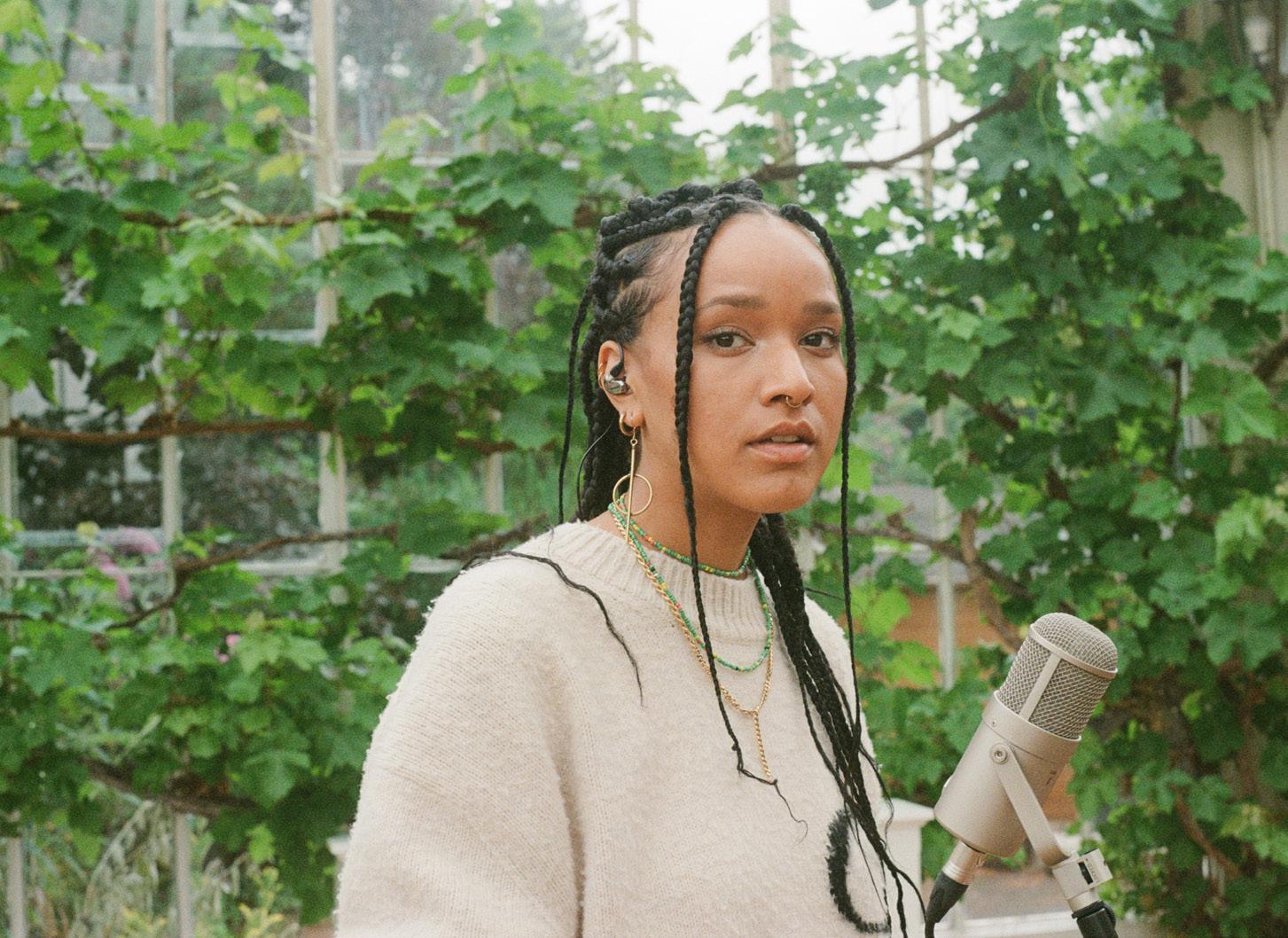
7
simone seales

Simone Seales is a classically trained cellist and improviser. Simone’s practice is influenced by intersectional feminism, sexuality, and anti-racism. Simone is interested in exploring the relationship between words and sounds therefore their work often includes words and poetry. Simone's work is tender and loving, it champions mental wellbeing and trauma-informed practices. Their recent performances in RashDash theatre’s Oh Mother celebrate the transformative effect of care and motherhood.
Simone has appeared in numerous festivals throughout the UK, such as their performance of With Catastrophic Consequences at the Hidden Door Festival alongside dancer Taylor Han. They have also appeared at the Edinburgh Fringe Festival as part of Demo Theatre Collective – a company focused on bringing music and theatre to new audiences which Simone co-directs with director and writer Katie Smith.

Other notable performances include Hope Springs Eternal, a spoken word, dance, and improvised music piece alongside Daniella Faakor Damptey available on YouTube Simone is the current Senior Lead Ambassador and teaching ambassador coordinator for the Benedetti Foundation. They hope to perform more poetry and music in 2023.
Simone's work can be found on their website and on YouTube under Simone Seales. You can keep up with them on their Instagram @simone.cello
8
Photography by: The Other Richard.
hip hop scotland
Hip Hop Scotland (HHS) was set up in 2010 to put a spotlight on hip-hop-influenced artists in Scotland. It follows on from Scotland Stand Up, a multimedia channel/blog established in 2009 by Steven ‘Scuba’ Duncan and Jonathan Rimmer. We ran reviews, podcasts, interviewed artists, shot videos, and covered gigs over the course of nine years, all with the goal of promoting the Scottish hip hop scene. Since then Hip Hop Scotland has evolved into hosting regular events and platforming artists through our podcast and playlists. Sanjeev Mann (Supermann on da beat) has been editor since July 2022. Wanna be part of the Hip Hop Scotland community? Join our new Facebook forum, to network with artists and benefit from being booked for shows. HHS radio which will be launching soon – in the meantime upload your tracks, bio and photos.

Our playlist SCOTTISH, BROWN & PROUD aim’s is to highlight the amazing Scottish South Asian talent we have on our doorstep. If you are a Scottish South Asian artist (all genres welcome) let us know via DMs or email sanjmann@hotmail.co.uk or hiphopscotland09@gmail. com and we’ll add one of your tracks. Make sure to also check out The Hip Hop Scotland Playlist on Spotify which is updated bi-weekly. We have be updating the playlist regularly and to kick things off we have tracks from:


@kapilseshasayee @random_brown_kid @asksupermann & @big_gluco @__nikhita @bee.asha.bish @23queenofharps @biggtaj @fizasings
@priyaferg & @razzmattreezy

9
Hope, Representation and Healing: Wakanda Forever - Not another Superhero Movie
By Muratiwa Chinake

In November 2022, four years later, after eleven Marvel Cinematic Universe (MCU) movies, and a global pandemic, the long-awaited sequel to Black Panther was finally released.
Black Panther and Black Panther: Wakanda Forever share certain similarities such as returning cast members and ideas of Black Excellence, but they explore different themes in their entirety. Black Panther is a celebration and a reconstruction of Black identity in popular culture. Whereas Wakanda Forever is an exploration and recontextualisation of grief, remorse, family, forgiveness, and renewal within the community. Black Panther: Wakanda Forever is therefore not just another superhero movie.
Instead, Black Panther: Wakanda Forever has provided a space for collective healing and mourning for the beloved actor Chadwick Boseman. Wakanda Forever allows the cast, crew, and audience members to process and grieve Chadwick’s fictional and real death, as the movie serves as a tribute letter to Chadwick’s legacy. The timing of Chadwick’s death, which occurred in late August of 2020, after a protracted fight with cancer, makes me believe that Chadwick also serves as a metaphor for all the losses we have endured but have never genuinely discussed as a group. Wakanda Forever allows everyone to lament the years lost to the pandemic, to reflect and move forward.
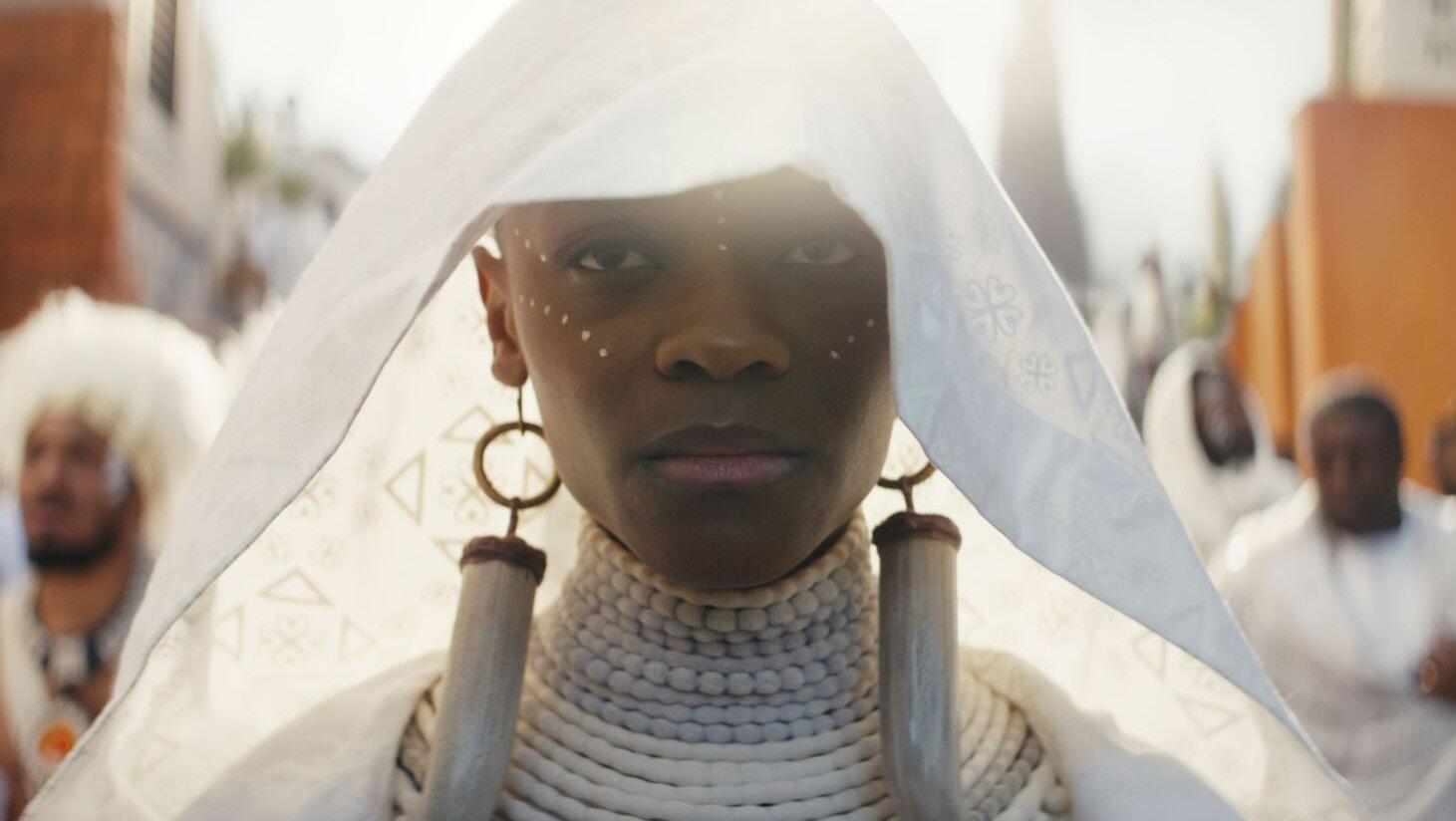
10
Black Panther: Wakanda Forever is not another Superhero movie. It has allowed a significant company to devote its branding, the Marvel Logo, to a Black actor, acknowledging and celebrating his legacy. The fact that he was never re-casted or re-inserted through CGI demonstrates how Marvel handled Black Panther differently from the rest of their films. It is the first time someone has died and remained dead, and it was not intentional for a new MCU phase. Ryan Coogler masterfully juggled the fine line between superheroism and realism as he celebrated King T’challa’s life and introduced his successor and other characters, important to the next phase of the MCU.
Black Panther: Wakanda Forever is not another Superhero movie. Instead, it is relatable. The funeral and grieving rituals relate to diverse cultures and religions that many people, worldwide, identify with. This display of global grief and loss is universal and unifying. The helplessness that many people felt during the pandemic is reflected in Shuri’s character as she was unable to save T’challa. Subsequently, her journey to forgive herself and accept this loss is a reflection of the emotions and growth induced by the pandemic.

Black Panther: Wakanda Forever is not another Superhero movie. It is representation.
Inspired by the film’s celebration of diversity and representation, below is a diverse watch list containing movies from 2022 exploring different themes, stories, and characters from diverse backgrounds:
Saint-Omer (Alice Diop), Decision to Leave (Park Chan-wook), Woman King (Gina Prince-Bythewood), Jazzman’s Blues (Tyler Perry),
Everything Everywhere All at Once (Daniel Kwan and Daniel Scheinert), Bardo False Chronicle of a Handful of Truths (Alejandro G. Iñárritu), Nanny (Nikyatu Jusu), RRR (S.S. Rajamouli), The Inspection (Elegance Bratton) Emergency (Carey Williams), Wildhood (Bretten Hannam), Saloum (Jean Luc Herbulot).
Black Panther: Wakanda Forever is not another Superhero movie. It is hope; hope that marginalised groups will be more widely accepted and celebrated across all areas and genres within Hollywood. The hope of a legacy reaching new generations to come. This hope is demonstrated in the film by Nakia’s son, Toussaint, also named Prince T’ Challa, the son of King T’Challa. This succession demonstrates to the audience that this film has earned its title of being Wakanda Forever as he, Prince T’Challa, continues King T’Challa’s legacy. The celebration of hope and life throughout the funeral rituals are used to send King T’Challa to his ancestral homeland, allowing the next Black panther to be reincarnated, passing the legacy forward. The interconnection between the traditional world and Wakanda shows an everlasting bond; thus, Wakanda is Forever.

11
we need equality for disabled performers
By Sanjeev Mann

My petition is asking the UK Parliament to provide funding to make venues fully accessible to visitors and performers is now live. Please sign and share!
https://petition.parliament.uk/petitions/630579
Being a disabled music fan, producer and DJ in the local scene, I wanted to go to more gigs to hear my music live - this was when I realised how inaccessible the majority of venues are. I noticed this even further when I started to organise and perform at shows - I quickly realised I couldn’t get on stage and it was a struggle to find a venue that had wheelchair access for disabled audiences and performers.

In terms of the arts, there seems to be a common misconception that disabled people don’t really exist. There are reasons why you can’t name 5 disabled musicians from the top of your head. Why? There are two main reasons. Firstly, people have low expectations and they’re shocked and surprised when they realise that disabled people can be equally successful as their able-bodied counterparts - this idea needs to change. Secondly, how can you expect equality when disabled people often can’t access stages to perform?
Millions of musicians start their careers by performing at small local independent venues, but for disabled people, this just isn’t the case because so many venues don’t have access to the performing area. For example, in Glasgow the majority of small venues aren’t accessible at all in any way. We need people to want to make these changes and we need people to take action because we clearly have the technology. We need to collectively keep fighting for an equal world!

If we went to the moon in 1969, then we can surely make all venues accessible and get disabled people on stage in 2023!
We need 100k signatures for the petition to be considered for debate, so please share with everyone you and show as much support as possible!
12



q&a with bee asha singh, singer, rapper, poet & co-founder of grassroots charity - spit it out
 Photography by: Rachel Dunlop Black
Photography by: Rachel Dunlop Black
CONTENT WARNING: Mention of rape, sexual abuse and trauma



When did you decide to create Spit it Out and why?
Spit it Out began in 2019 when the BBC aired Co-Founder Lea Luiz de Oliveira’s documentary - Spit It Out. The film followed my journey, two years after being raped, showing how I use music, poetry and performance as a tool for recovery and how this helped me to regain my confidence. Lea and I became close friends and decided to continue this new adventure together. The film acted as a springboard for what has become a
vibrant community of artists, performers and partner organisations, such as Intercultural Youth Scotland, Summerhall Edinburgh, EHFM and CCA Glasgow. This experience showed us that there was still a strong taboo around trauma. It felt impossible for people around us to open up about their mental health. We decided to create a collective of talented people dedicated to having conversations around sensitive topics in a safe and relaxed environment, which has grown to become the women-run grassroots charity that Spit it Out is today.
What was Spit it Out’s aim in the beginning and has that changed?
We originally were focused on using creativity to open up conversations around consent and healing from sexual trauma, but we have grown! Spit it Out now runs events and services that aim to open up all taboo subjects and discuss marginalised issues on a larger scale. We have also become very passionate about Transformative justice and are aiming to get more into campaign work.
14
Why is community so important to what you do?
I believe community is the core to change. So often, we feel isolated, especially if you are from a marginalised background, have been faced with Mental health issues, or experienced trauma. It’s often hard for us to lean on those around us if we have small friendship groups, families or feel completely alone. The stronger a community is and the more resources the community has, the safer we all are to grow.
What taboo subjects do you think we should be talking about more?
Everything. We need to talk about it all. Without judgement, stigma or shame, but with empathy and a willingness for change.
What are your hopes for the future of Spit it Out and what do you want to illustrate?
We want to create a sustainable change in our society. We hope that we can get fully funded in order to help more people. We want to offer resources and spaces to those dealing with trauma or mental health issues and also to those who are supporting those who do, or who are just wanting to learn in order to help create a better society. We believe in creating completely accessible spaces and so try to make our events pay-as-you-can. If they aren’t and you can’t afford it, we are always up for wavering the fee where possible – just reach out. We also believe in fair pay for artists, and strive to have the funding in place to support that.
What is your relationship to Scotland and your Scottishness, and does this influence Spit it Out at all?
I feel Scottish, like very patriotic towards the country. I love it. I feel like it’s a small enough place for us to make an actual impact on the way our society is. We
could implement actual changes into the structure of our state here and that’s what we hope to do through Spit it Out. Make sustainable change to the way our culture sees and reacts to harm.
What type of services and support does Spit it Out provide?
We have 5 main services:
Aye Breathe - Monthly activities that help you connect to your breathe, body, nature or community.
Aye Connect - A monthly meetup hosted at August 21 cafe in Edinburgh on the last Tuesday of every month. It’s a chill space for the community to come together and to meet like minded folk.



Aye Thrive - We host 1 or 2 monthly workshops that can be about anything. Creativity, Mental Health Support, Change.
Aye Share - We host 4 - 8 performance events a year, where people are encouraged to come and share their creativity. These can be gig nights, spoken word events or event ceilidhs.
Transformative Justice Group - A group that meets monthly to discuss Transformative Justice. We’re all learning together and creating resources around how to approach crises with a transformative justice approach.
We Also host a yearly festival - The Spit it Out Festival. We hold up to 50 events in multiple venues across Glasgow, Edinburgh and Online. The Festival is at the end of June and is a really immersive space for learning and sharing. Additionally we release a yearly magazine, podcast and campaign around a taboo subject. As well as offer 1-2-1 support to individuals wanting to fully realise a project.
To keep up with the work Spit it Out does follow them on instagram, sign up to their monthly newsletter and don’t forget to check out their website!
15
kashish bhatia photography
Inspired by the aesthetic of the hit TV series

Euphoria, Kashish Bhatia produced these gorgeous images as part of her Higher Photography portfolio. By playing with coloured lighting they have emulated the hazy, moody, lighting featured throughout the series.


felix
16
round photography

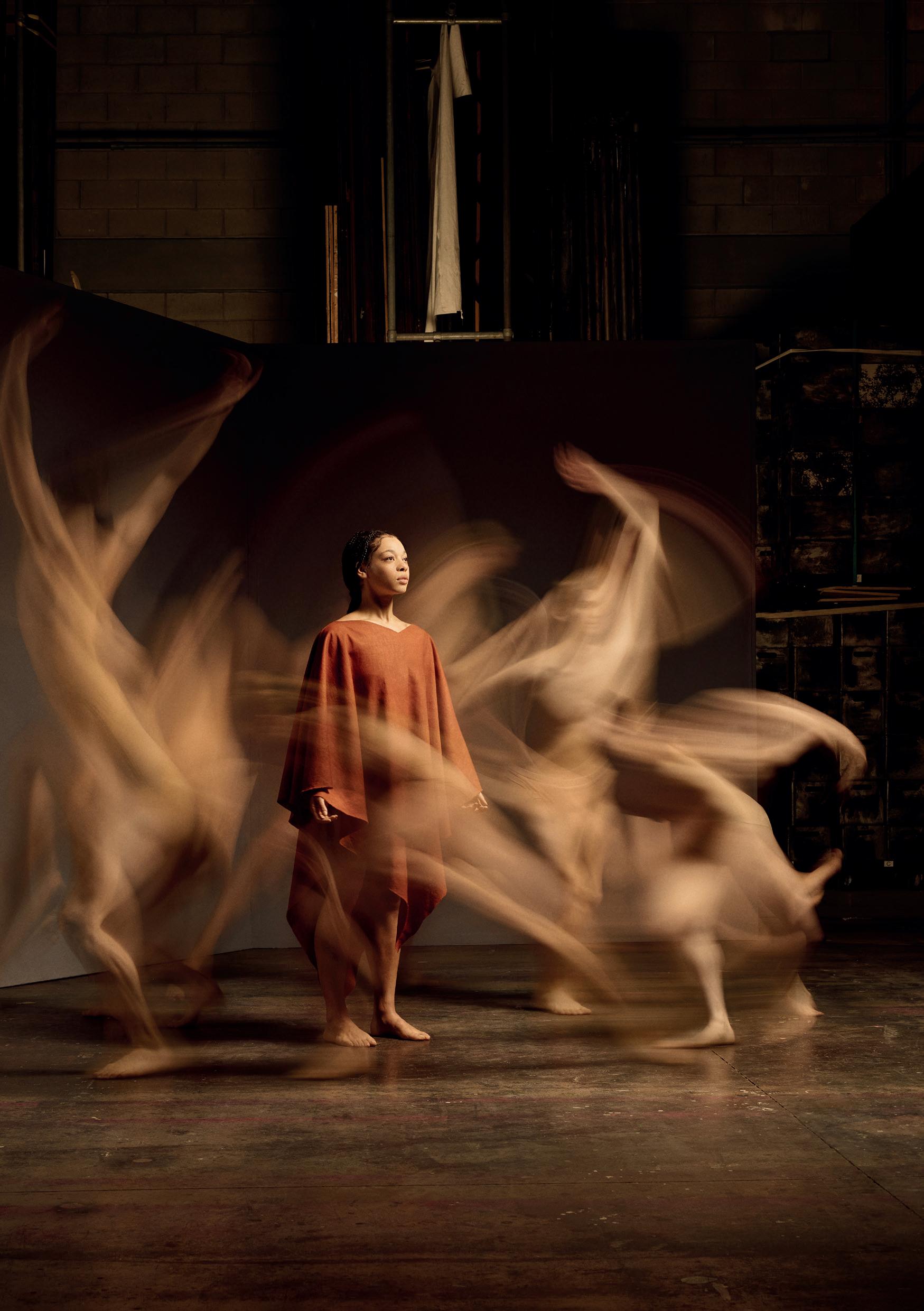









































ARTWORK BY SCOTTISH BALLET DESIGN TEAM | PHOTO BY GAVIN SMART REGISTERED IN SCOTLAND NO.SC065497 | SCOTTISH CHARITY NO.SC008037 HIS MAJESTY’S THEATRE ABERDEEN 6 OCT THEATRE ROYAL GLASGOW 21 — 23 SEP FESTIVAL THEATRE EDINBURGH 20 — 21 OCT WORLD PREMIERE Twice-Born Choreographed by Dickson Mbi UK PREMIERE Schachma Choreographed by Cayetano Soto Twice-BornBOLD DANCE BY TWO VISIONARY CREATORS SEPTEMBER — OCTOBER
ali



zaim
“So, the criminal underbelly of society right now - it’s not all PoC – but it is a lot of young PoC, boys specifically running the streets. So it’s that point of decision where he’s like the world is already set up against me. Nobody else’s played to the rules. Why should he? So he’s going to play by his own rules.” -
Zaim Ali

Shot entirely on film, Ali’s collection of images delves into the issue of criminality, violence and the representation of PoC in divers western cities. Inspired by the song If I Ruled The World by Nas, featuring Lauryn Hill, the photographer follows a young man’s internal journey as he decides between choosing to commit a criminal act or not. Ali’s work is a questioning of why young PoC are funneled into this lifestyle by the system around them. To Ali, engaging in illicit activity is often about the desire to have control over one’s own life when, “in Western society everything’s built up against PoC so that they don’t have any control”. These images do not seek to promote violence or involvement in street life, but instead offer an unfiltered critique of the systemic and structural gaps that have created such narrow opportunities for PoC in urban spaces.
Ali is set to continue this work in a 5 part series and interactive exhibition which he aims to have available to the public by the end of 2023.

19
a night to remember:



proudly black & scottish awards
by hazel peters

Proudly Black and Scottish (PBS) is a platform celebrating and furthering Black creators, entrepreneurs, and individuals in Scotland. In October 2022, they hosted their first awards gala which brought together many up-and-coming Black, Scotland-based creatives. It was a night of opulence, glamour and joy. In November 2022, Hazel sat down with one of PBS’s founders to learn more.
The Proudly Black and Scottish Awards were a subject of intrigue from the moment the announcement appeared on our social media timelines in Summer 2022. An awards night for the Black Scottish community? Since when? The awards were quite literally something new and exciting. Individuals, organisations and businesses were nominated by the public across a series of award categories spanning music, hospitality, entrepreneurship, and social causes. Hosted at Glasgow’s Hilton Hotel, the night began with a three-course meal and live music, followed by the award ceremony, and finishing with an afterparty. One thing Black people will do is show out for an occasion, and the awards gala proved no different. With the gorgeous gowns and slick suits, the attire was doing the most in the best way possible. It was wonderful to see many of the attendees dressed in their traditional cultural clothing, celebrating the beauty of their respective cultures.
Establishing yourself as a creative or entrepreneur has its universal challenges, but it is particularly difficult for Black creatives and entrepreneurs in Scotland, who are consistently marginalised and denied positions of power and influence in Scotland’s creative landscape. PBS’s representative says, “Black creatives can become discouraged because their talents and achievements are not appreciated or recognised.” They hope that by highlighting potential and celebrating success through the PBS awards gala, creatives will be encouraged, “to not give up on themselves and their craft.”
Reflecting on the night, PBS’s representative has many highlights, but their main takeaway is, “I was just happy to see people happy. It wasn’t easy pulling something like this off, but seeing people stand up to collect their awards, to clap for each other and celebrate our cultures, made every single obstacle we faced in the process worth it.”

20
PBS’s representative is also quick to remind individuals not to measure their worth with an award, “just because you haven’t been nominated, it doesn’t mean that you’re not worth it. Keep doing what you’re doing. This is the time to clap for somebody else, but your time will come.”




The PBS Awards Gala will return in October 2023, bigger and better. There will be a revised nomination process, seeing award winners determined through a combination of public vote and an independent panel of experts. By doing this, PBS hopes to make the process as meritocratic as possible. Capitalising on the momentum of the first awards gala, PBS has plans to launch their Creator Network programme –“a collective of creators, entrepreneurs and businesses coming together to create a community of support where we can tap into one another and help each other grow.”

21
The World of Politics and Policy in
Scotland for People of Colour
By Lauren Cadore
I spoke to Dr. Mark Wong, a Senior Lecturer at the University of Glasgow about the world of politics and policy in Scotland for People of Colour. His work specialises in policy and digital society, AI and addresses the harms and bias of AI/data on People of Colour.
What inspired you to get into your field?
I’ve always been passionate about social justice and inequality. Growing up, I would get angry about things that were unfair. From small things, like school or how students were treated by teachers. More generally, despite it sounding cliché, I was inspired to get into academia as I wanted to make the world a better place. Academia lays the foundations for someone to do this in a realistic way, by providing you with the tools to create structural social change. I was particularly interested in data and AI justice and how that intersects with racial inequalities and the role this would play in making the world a better place.
What steps did you take to get to your current position?
I grew up and lived in Hong Kong until I was sixteen. I then studied in Wales for two years for the International Baccalaureate. Following that, I moved to the University of Edinburgh and there I studied from undergraduate level right through to my Ph.D., before moving to Glasgow to work as an academic in Urban Studies. I didn’t go between university and another job before moving into academia partly due to the difficulties of having to find a job. In the last couple

of years, I’ve started doing more policy work [with the government] beyond the research and teaching aspects within academia. I’ve been involved in some of the work surrounding Covid-19 and whether or not ethnicity questions should be included in the vaccine programme, working alongside senior colleagues who have been involved in high-profile research giving advice to Scottish government committees. That's what got me more involved in the policy aspects, alongside my job as an academic.
From your perspective, are there any barriers facing POC’s in your area of work?
Absolutely, I think some of the statistics around the higher education sector for People of Colour are quite dire. For example, in the UK, less than 1% of professors are Black women, and only 7.8% of professors in academia are Asian.* Typically Chinese academics are found within professions such as Science and Engineering. As a social science academic, you see the systemic barriers in place as there are so few PoC in my place of work. Sometimes, in big meetings or conferences, I am the only PoC in the room. I think it's improving slightly, but there are still massive amounts of white privilege in these spaces which can lead to feeling lonely and isolated at times. Westminster politics often dominate our news feeds. Do you think this has an impact on our ability to create social change in Scotland?
Yes it does. The way that people engage and consume news has changed in the past 10 years, particularly with social media platforms inciting more hate, dividing, and polarising opinions. I think because of this, it’s harder for people to understand what the actual issues are. In regards to the Westminster issue, I think issues of devolved powers are prominent at the moment. This can be seen in the
22
gender recognition bill, where the Scottish government voted to approve the legislation, which was then blocked by a UK Minister, The Secretary of State in Scotland. This power imbalance often undermines the Scottish system and makes it more difficult to achieve social change. There’s also something to be said about the dual narratives of Westminster politics vs. Scottish politics. In Scotland, the bill has undergone a large consultation process over a few years and has appeared in local news and discussions within Scotland, whilst in Westminster, this was not the case and the news was reflective of this. This greatly impacts the ability to create social change when powers are ultimately decided at Westminster and the news for the majority of the UK presents a warped picture of what is happening in Scotland.
Many BPOC in Scotland don’t consider working in Scottish politics, despite often having an interest in creating social change. In your opinion, how can Scottish politics, both the visible kind (eg. being a Member of Scottish Parliament), and the less visible (eg. working serving as a civil servant), become more accessible to BPOC in Scotland?
There tends to be a focus on the upskilling of PoC to encourage them to get into politics. However, I think this can be slightly problematic as it keeps the focus on PoC rather than addressing the systemic issues surrounding access. Providing targeted support at the application stage can help address some of the systemic issues such as lack of resources and access to networks. Especially for people who have not grown up in Scotland, and when English is not their first language, without proper support and understanding the language and linguistic issues can be challenging to mitigate. Things like the way job descriptions are written or not having mentors and support systems who look
like them, can create barriers to employment. There needs to be support for people when they enter the job. Once again, language and how it’s used in the political landscape, alongside the bureaucracy of the system can be alienating for PoC. This alienation can lead to imposter syndrome because the system creates an environment that makes you feel like you don’t belong.
What would your advice be to someone from a marginalised group entering the world of policy or politics in Scotland? My number one tip would be to not write yourself off, give yourself a chance. As discussed, the many barriers to PoC often result in people opting to avoid this line of work. Representation is important and the more PoC working within politics and or policy, the more meaningful change can be. My second tip would be to speak to others, utilise your networks and support from others within the system who face similar barriers and challenges. This helps take away some of the feelings of isolation and takes the pressure off the individual, helping you to find solidarity with people.
Could you provide some ways BPOC in Scotland can become more involved in Scottish politics?
In Scotland, The John Smith Centre, runs the Minority Ethnic Emerging Leaders programme which is an opportunity for 50 young people across Scotland to take part in a paid part-time internship for 9 months at a public sector organisation or the charity sector. The scheme also gives these young people a mentor. Last year I was a mentor and was able to coach and train some of the young people through life in the public sector, specifically as a PoC.
*Hesa. 2023. “Higher Education Staff Statistics: UK, 2021/22.”
Hesa. 2023. “Table 27 - All staff (excluding atypical) by personal characteristics 2014/15 to 2021/22.”

23
i didn’t feel welcome at first
 by roisin fredrick
by roisin fredrick

I didn’t feel welcomed in Scotland at first The phrase “You can’t be Irish you’re Black” became very common My hair was judged
People didn’t seem to like my hair, they thought it was too greasy
Or my Nigerian culture
The Ebola song made it worse
I never truly felt confident in my identity
Am I Nigerian? Am I Irish?
Am I Black enough?
The last one became my identity
I’m too whitewashed to be considered Black
But too Black to be considered otherwise
But it’s Scotland that gave me a chance to find myself
It introduced me to IYS & ACS* Gave me the opportunity to redefine what being black is I don’t need to fit the stereotypes
I like country music and no I can’t dance
Because being black is so much more than
Asian face, Asian taste with an Asian mind, enters Scot’s trace, history embraced and welcomed with a pint. Glasgow, Aberdeen, Edinburgh and Dundee, Haggis, Whisky, Scotch eggs with a Wee Bits of confusion.
Yet excitement filled me chest, Uncover the foreign To take up the role of the foreign. Puzzles and mysterious compressed.

Alone in the room with the blue and white
After I was taught to separate them from the red and white. Three lions or one, Harp and unicorn
 winter aboard by sin i ng
winter aboard by sin i ng
* IYS – International Youth Scotland & ACS – African Caribbean Society
24
illustration by kumi mckenna
Barriers break, while I was comprehending. Flat filled with people that are engaging. Either way I was enjoying, Yet when Winter came everyone went home, But where is home when winter aboard bowfin And howlin’ Eejit through Saorsa.
Pack me bags and off me go, Smourich on the head and bless me Noo Sooner I realised the depth I am in, On my way to Loch Lomond, Passed the Oban Inn.
Years flew by and time will fly, Nothing lasts but a good old “Aye”. The blue and White stuck within From that winter aboard that I had been Cold and night fall around four Heart filled with Eenoo gin, Not only am I warm, But the bits inside kept my calm. Though I was a foreign but long ago, The first winter aboard, Had already brought me in.
after autumn equinox
 by jJ fadaka
by jJ fadaka
A city in November
Winter sun blinds us to many things. I rub a nut balm between my palms in the evening
Melt the frost of the day Wait for the heat to sink in.
High-speed winds in the North Crisp new thirst. Already over-exposed to loss
You watch the same winds whip up the ire of the sand

Mixing mud in the floods
At home
Fallen leaves crown November streets
Drawn to
The unhoused sitting now On golden thrones
Whilst we avert our gaze
Common royalty struggles to protect their place.
I see the season paradoxical Like the end of change. We celebrate death and grief
Under a burst of fireworks. From Spring
Gifted new fruits left to waste. On Southern plains
Gifted new fruits beg for change. And the years that once stayed the same lie lonely in their nostalgia.
I saw you shed a tear for love strained. Sharp and hardened in winter days
Cracking skin struggles to hold onto what remains
Cracking infrastructure struggles to contain its hate.
Connecting fate
On borrowed time.
Closer than ever, we ask Will we last this winter?
Our worlds, our homes Will they emerge again?
25
writing has been my outlet to compensate for my silence
By Claudia Efemini
Growing up I have always been quiet. Not the type of quiet that fosters isolation and disengagement but rather the kind that creates a space for constant bursts of thought in my mind. As a child, when teachers would ask the class questions, instead of throwing my hand up to answer, I would have conversations in my head. At times I’d come up with multiple possible responses in my mind forgetting that the aim of posing questions was to hear a response. It is through my experience of studying History and Politics at the University of Edinburgh that my voice
beckoned to be heard. I’ve responded to this call far better than I would have as a child. I’m quite proud of my personal growth in public speaking, but it's been far from perfect and improvement can certainly be made.

My experience of studying History and Politics has been bittersweet so far. I use this oxymoron as it quite perfectly explains the equilibrium between freedom and constraint. Whether it be the freedom granted by broad essay questions prompting me to delve into aspects of African history that interest me; or the constraint of scanning through course options that all have one thing in common, the neglect of African and diasporic voices and experiences.
Early on in my first year of university I was frustrated by the limited course options that interested me, and or related to my ethnic background. I simply couldn’t fathom why choosing to study a subject that I was passionate about still placed so many constraints on my learning.
I frown at the thought of my teachers and mentors at sixth form who had encouraged me that university would be different to sixth form, that I’d finally be able to learn what I wanted. I had to swallow the tough pill of being content with knowing that Nigerian history was not something that I can study extensively at undergraduate level due to a lack of specialised lecturers in the area at my university.
Reading this, you may interpret my words as assertive and challenging, but I’d be dishonest to suggest that these concerns have been articulated on my own within the walls of my university. I have grown to acknowledge that my introverted nature affects my willingness to verbally oppose this ‘one-sided’ curriculum. It doesn’t help either that I am one of the very few Black

30
illustrated by maryam zaki
students enrolled on the history course, and we know that there is power in numbers. But when the numbers are near to non-existent it places more pressure on the few to make drastic calls for change. Advocacy is exhausting, and often goes hand in hand with the toxic notion that one’s advocacy must be constant and take a specific form, otherwise it demeans the importance of the issue at hand. It’s almost as though, if you do not organise protests against eurocentric curriculums, or verbally represent an entire community during tutorials, then you aren’t doing enough. This can take a toll on a student’s mental health. So, for those few tutorials that discuss aspects of Black history, and despite being extensively prepared after spending my time indulging in literature that I’ve been dying to read, I tend to shy away from taking on the leading role that was expected of me. I often refrain from asking questions that could challenge a lecturers’ firm stance on globalisation and its effect on nations across the world.
However, this doesn’t mean that I’ve made no effort to highlight the eurocentric curriculum, particularly in the field of history, offered at a Scottish university. One day in December, I had my lightbulb, Eureka moment, and I started writing, what would become, my debut novel Letter Away From Asaba. A Letter Away From Asaba, tive centred on the 1967 Asaba massacre of the Nigerian Civil War - an event of the Nigerian civil war that has been minimally explored within scholarship. The story follows the lives of best friends Onome and Chioma. Through a series of diary entries and letters these two young women attempt to come to grips with the massacre and fulfil their desire of publicising its existence in opposition to this censorship.

It was the perfect hobby. By combining my passion for Nigerian history and my love for writing, it enabled me to channel my frustrations with my eurocentric degree to create something that both educates myself and others on the Asaba massacre and the Nigerian civil war. Through my gift of writing, I found my way to advocate for change which has compensated for my verbal silence. Writing about a thousand words every night soothed the deprivation that I felt within my degree, and crucially, it enabled me to see that my degree isn’t a waste. I utilised historiographical research and critical thinking skills developed through the curriculum, which helped cultivate ideas for my novella.
I want anyone reading this to know that it is alright to be a quiet student as long as you are working on improving your verbal competencies. If, like me, you feel heard and can better articulate yourself in written form then you are also capable of doing great things just as our fellow great orators are. The most important thing is to

31
decolonising wellness: dismantling the capitalist cultural appropriation of wellness and re-envisioning bpocled wellness and mental health care
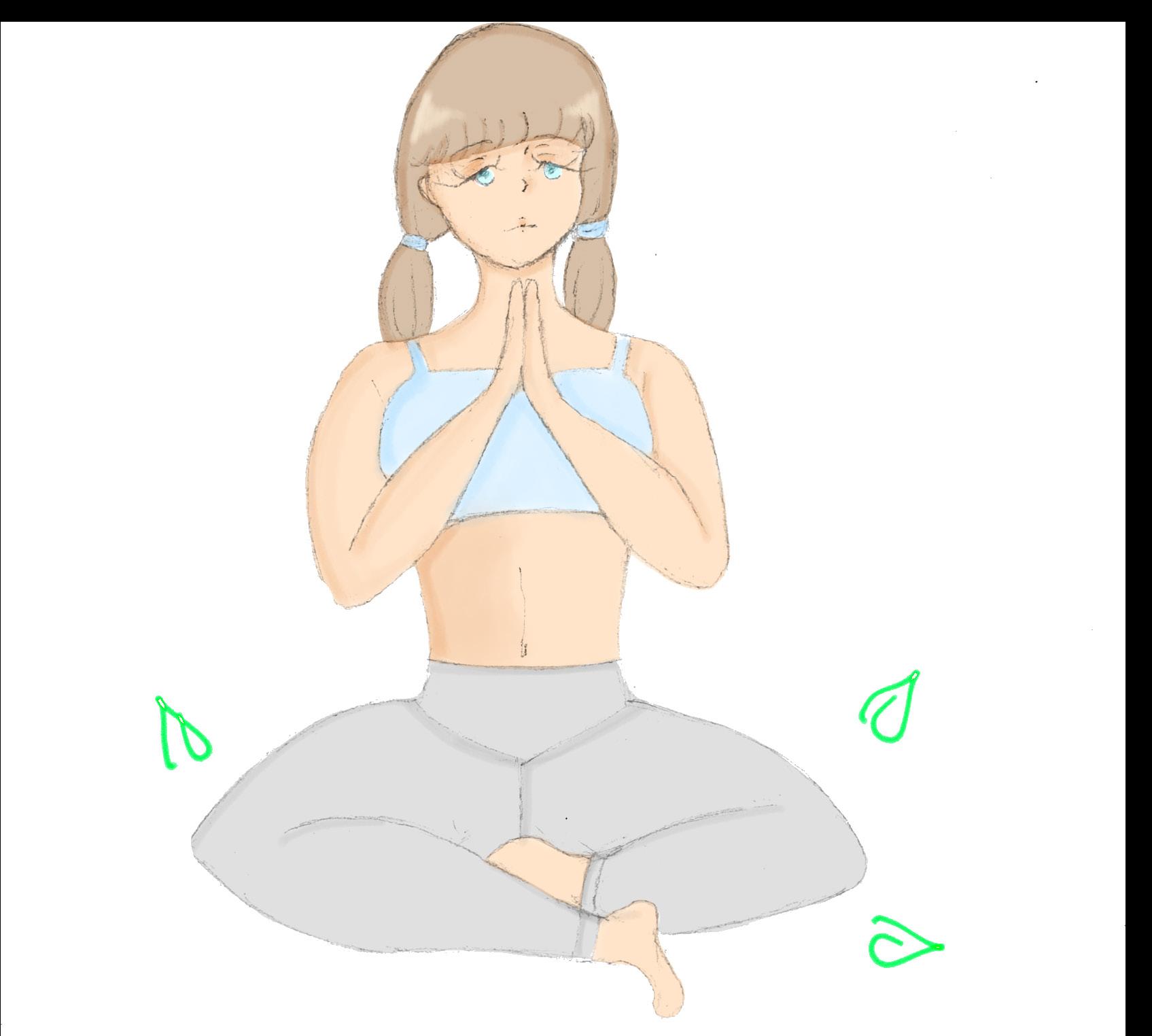
 by renite gosal
by renite gosal
Wellness has become a buzz-word in the mental health field. Yet, much of the wellness practices encouraged today have been heavily capitalised, and often appropriate traditional holistic health practices from Black, Indigenous and People of Colour’s (BIPOC) cultures. Non-medicalised, community-based care that incorporates traditional practices is generally a positive step forward for mental health care. However, it is necessary to decolonise the wellness industry and create safe, non-capitalist spaces for mental health care for and led by BIPOC.

33
illustrated by maryam zaki
Traditionally, biomedical approaches to mental health have intersected with coloniality and racism, creating systems of violence and in instances such as the Tuskegee Syphilis Study in America, serious breaches of consent, autonomy, and justice. Due to long, global histories of Black, Indigenous and People of Colour being appropriated, trialed, tested, tortured, institutionalised, harmed and invisibilized by the medical industrial complex, it is imperative that BIPOC-led, culturally-competent, anti-racist mental health care is available in addition to biomedicine.
With merely 4% of Scotland’s population being non-white, Black and People of Colour (BPOC) in Scotland require accessible, low-barrier, safe spaces from racism and discrimination and to share experiences of mental health. Additionally, due to relations between the justice system and medical industrial complex, citing mental health acts in Canada, France, and Scotland for instance, that permit forced institutionalisation, care that is conceptualised and constructed by BIPOC communities is critical. But how can we reclaim what was once ours, but has now become a child of Western capitalism?
From my position as a South Asian in the diaspora, there is a push and pull between me and my wellness habits and the exorbitant cost of the wellness industry, from overpriced yoga classes, to overpriced yoga pants, to excruciatingly expensive lattes with haldi (turmeric).
In all honesty, I wouldn't mind the price as much if some of the studios, clothing brands and cafés paid homage to our culture, traditions and ancestry. But watching the West take yoga classes and drink haldi lattes to reduce their waistline
can be exhausting at times, causing me to disengage from what really are practices and habits from my own culture but have since been claimed by diet-culture and health and wellness fads.
How can we reclaim that which improves our mental health that has already been embedded in our cultures for years, but disrupted by colonialism and now capitalised upon and re-colonised by the ‘new wave western’, ‘woke’ wellness movement?

We need community leaders. We need cultural teachers. We need low-barrier access to wellness practices. We need community spaces. We need to honour our roots. We need to lean into our traditional ways of healing. We need regular conversations about decolonising health and wellness. We need less capitalism.
So I ask, how will you decolonise the wellness industry and reclaim traditional wellness practices?
34
diaspora blues
 by malini chakrabarty
by malini chakrabarty
Diaspora Blues is a visual story that explores the journey of finding a home. It is based on my lived experience as a journalist in India and choosing to leave everything familiar behind alone in search of a place to call home. It is the feeling of belonging to two places yet being too foreign for both and not knowing where one is really from. The first frame explores the reason I decided to leave India including the news headline of the $60 million scam I had uncovered as an investigative
journalist, and gives glimpses of its failing democratic indexes, specially press freedom and women’s safety. The frames explore my experience of leaving the Indian subcontinent alone with two suitcases and realising that I’m on my own in a new land where I know no one and then finding a space where I belong. The frames also describes my current experience as a WoC in Scotland, a place I’ve come to call my home.


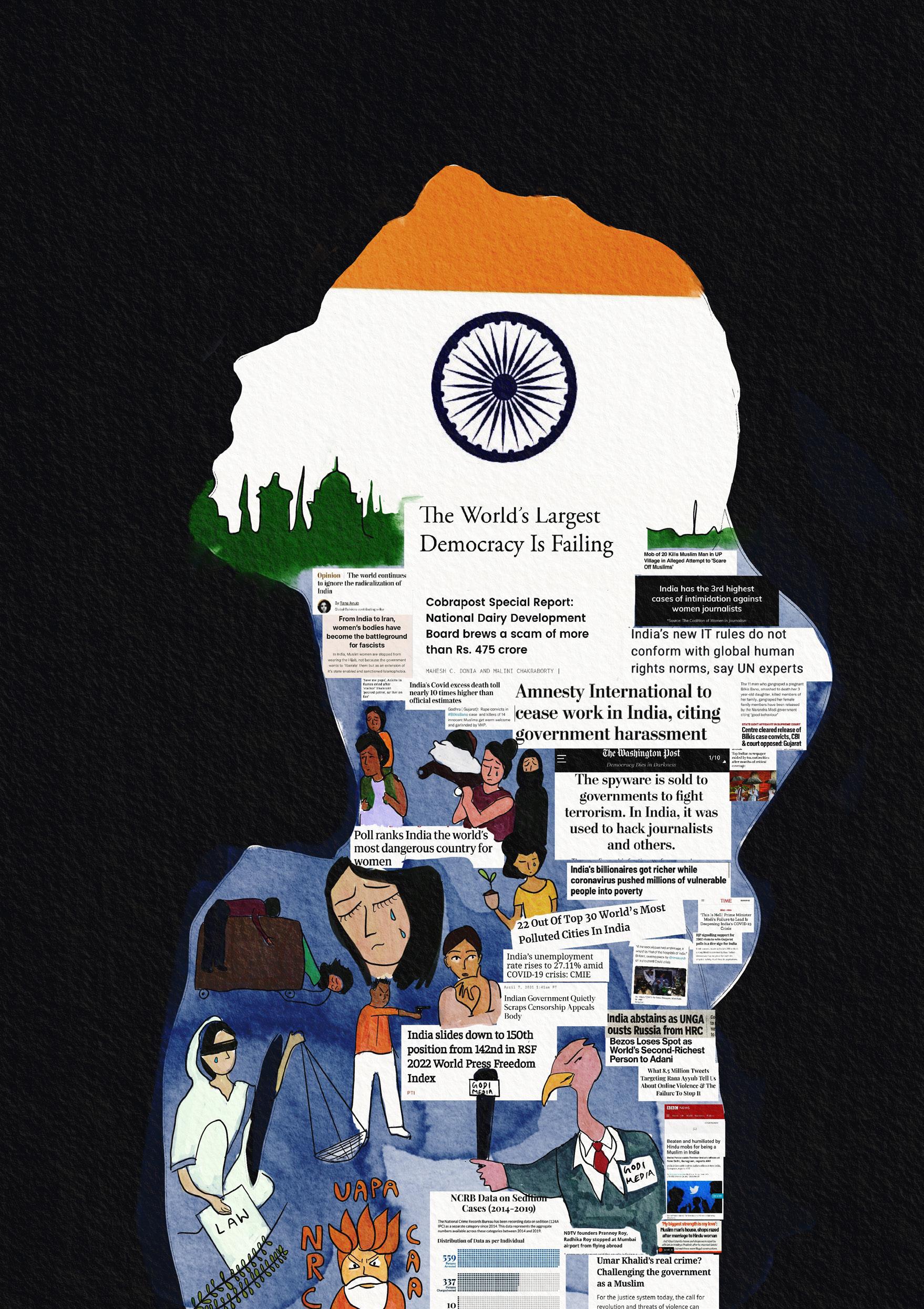




Scan here to read Scott(ish) online








 Article by, Halim Dyfan Illustrations by, Nytastic
Article by, Halim Dyfan Illustrations by, Nytastic



 by malcom kyenune
by malcom kyenune





















 Photography by: Rachel Dunlop Black
Photography by: Rachel Dunlop Black


























































 by roisin fredrick
by roisin fredrick


 winter aboard by sin i ng
winter aboard by sin i ng
 by jJ fadaka
by jJ fadaka






 by renite gosal
by renite gosal


 by malini chakrabarty
by malini chakrabarty






